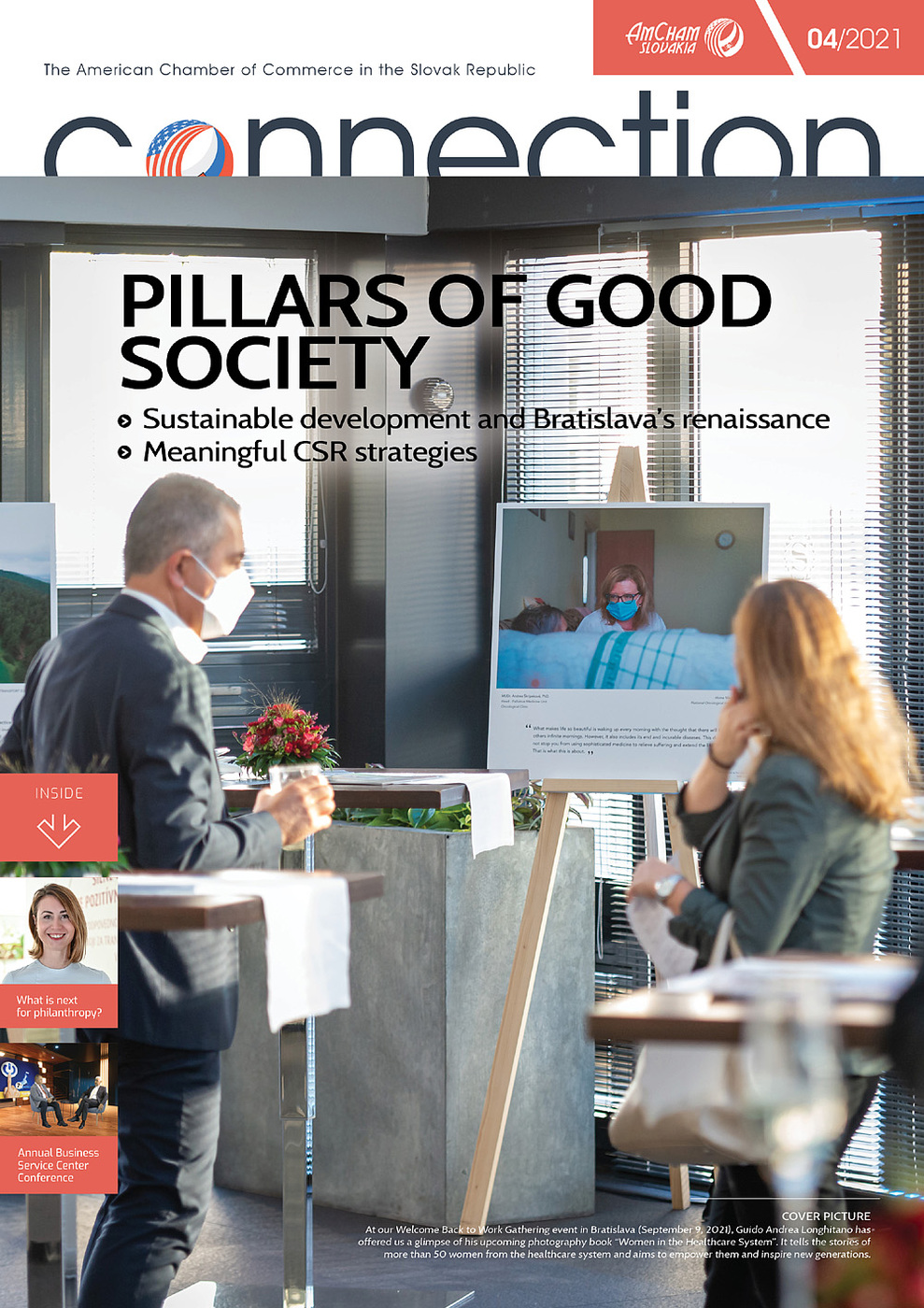
Download PDF
- What is next for philanthropy?
- Making the connections between work and life
- In search of the correct term for responsible entrepreneurship
- All good things come from within
- ESG: A key to long-term sustainability
- Building a resilient and innovative capital of Slovakia
- Sustainable development and Bratislava’s renaissance
- Fostering innovation at schools
- Cheap electricity is green
- Reinventing batteries from dirty to recyclable
- The inspiring sustainability journey of McDonald’s
- Trends and opportunities in sustainable business
- Compliance is an integral part of responsible business
- A circular strategy with real value
Pillars of Good Society
What is next for philanthropy?
Whether we want to or not, we cannot change the time we live in, but we
can learn much from what it tells us about our future. One of the areas
affected by the pandemic was giving and donating. Although philanthropy
has changed before, the last year has helped us to better understand
which path it could take.
Making the connections between work and life
Success comes at a price. Business leaders face difficult decisions regarding demands on their time on daily basis. The responsibility towards their families and their employees makes them carefully consider each minute of their day. We want to know how they like to spend their time out of work, what inspires them and motivates them.
In search of the correct term for responsible entrepreneurship
Is the concept of CSR becoming less relevant as companies understand it “only” as philanthropy and want to do more? Does the currently used abbreviation ESG better describe the broad spectrum of responsible entrepreneurship? Or does the notion of sustainability better encompass everything that has been forgotten in CSR in the past?
All good things come from within
You cannot do something if you do are not truly committed to it deep inside yourself. If your mind is not set on the goal you aim to achieve and if you do not feel the urgency yourself, you cannot advocate for change.
ESG: A key to long-term sustainability
While concepts like Corporate Social Responsibility (CSR) and Socially Responsible Investing (SRI) enjoy broad popularity, ESG has begun taking center stage in wider sustainability discussions. Is ESG just a different take or trendy term in the alphabet soup of good corporate citizenship, or something longer lasting?
Building a resilient and innovative capital of Slovakia
With the progressing climate change, Bratislava will eventually find itself in a subtropical climate suffering from extreme weather occurrences while struggling to accommodate a growing and aging population and the need to develop new economic avenues. Cities will also be pushed into climate change mitigation measures like decreasing carbon emission using alternative energy sources, offering new mobility options, smart waste management, planning public spaces or building energy efficiency.
Sustainable development and Bratislava’s renaissance
Cities are living organisms that can transform surprisingly fast based on changing external conditions, or the needs and demands of its inhabitants. The need to adapt fast to trends which will shape urban life in the future is crucial. However, with a wide array of involved stakeholders with varying interests, long-term planning becomes quite a challenge. We talked about the specific situation in Bratislava with Milota Sidorová, Director of Urban Studies and Participatory Planning Department at Metropolitný inštitút Bratislavy.
Fostering innovation at schools
How can we bring the world of innovation and technology closer to schools and communities? How can we do so inclusively so that no child is left behind? By focusing on skills, which we know will be indispensable in the 21st century.
Cheap electricity is green
In the past few weeks, an evergreen political issue returned to the headlines: expensive energy. Both due to the pandemic, renewables subsidies, as well as closures of nuclear power plants in Germany, the European market price for electricity spiked, translating into higher prices for consumers in 2022.
Reinventing batteries from dirty to recyclable
Imagine you have a brand-new car. You open the door and sit comfortably. The car still smells of newness. You turn on the engine, lights, air-condition, radio, or even navigation and you enjoy the ride. But none of these would work without power.
The inspiring sustainability journey of McDonald’s
Sustainability is a term that resonates throughout our society, especially with regards to sizeable international corporations, whose decisions have the most substantial impact on the environment. Many global industries have shifted their focus and resources to a more sustainable operation that minimizes its impact on our planet, with the foodservice industry taking the helm of this initiative.
Trends and opportunities in sustainable business
The July report of the Intergovernmental Panel on Climate Change unequivocally confirmed that human activities are warming the planet and irreversibly disturbing its climate. During this crucial decade, humanity must reduce its emissions by at least 50% to keep the average global temperature rise below 1.5 °C.
Compliance is an integral part of responsible business
The issue of quality of corporate governance is highly debated worldwide. Slovakia is no different – with a dynamic development in the approach to corporate governance, business ethics, as well as an increasing emphasis on relationships with employees and customers.
A circular strategy with real value
How was the first waste created? The one-way linear model of production, which we are used to, introduced the concept of waste. Due to inefficiencies in the process we tolerate producing and storing byproducts which serve no purpose and are at least costly and at most harmful.

Follow us